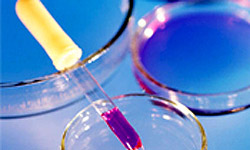Iran Produces New Nano-Sensor to Detect Tinidazole Medicine
Iranian researchers at Sharif University of Technology synthesized glass carbon electrode modified with a thin film of carbon nanotubes and gold nanoparticles, and used it as a nano-sensor to detect and measure tinidazole medicine with a precision of 10 nanomolars.
This nano sensor is able to be used in paraclinical laboratories and pharmaceutical companies, and also in the measurement of important medical and cosmetic materials in order to diagnose illnesses.

"By taking into account special advantages of carbon nanotubes and metallic nanoparticles, we firstly synthesized a composite film of these two nanostructures on the surface of the glass carbon electrode. After the production of the nano sensor, its performance was evaluated in the measurement of drug in medical and clinical samples," Dr. Shahrokhian, a member of the Scientific Board of Chemistry Faculty of Sharif University of Technology and one of the researchers of the plan, stated about the research.
The measurement of tiny amount of tinidazole by using the modified electrode was carried out through linear scanning voltametry method, and a detection range of about 10 nanomolar was obtained for it. The electrode has been used successfully in the measurement of tinidazole in medical and clinical samples (human's blood serum), and acceptable accuracy has been reported for it.
"Among other important characteristics of the produced sensor, mention can be made of high stability of the film and its very good repeatability as well as the fact that the surface will not be polluted by pollutant materials. Due to this characteristic, the surface does not need to be replaced or to be pre-prepared," Dr. Shahrokhian added.
Source: Nanotechnology Now
- 488 reads
Human Rights
Fostering a More Humane World: The 28th Eurasian Economic Summi

Conscience, Hope, and Action: Keys to Global Peace and Sustainability

Ringing FOWPAL’s Peace Bell for the World:Nobel Peace Prize Laureates’ Visions and Actions

Protecting the World’s Cultural Diversity for a Sustainable Future

Puppet Show I International Friendship Day 2020

